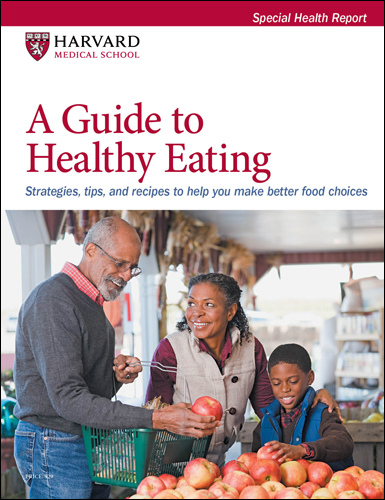Nitrates in food and medicine: What's the story?
Deli meats, leafy greens, and certain heart drugs all contain nitrates in various forms. How do these compounds affect your heart?

Composed of just nitrogen and oxygen, nitrates are simple compounds that occur naturally in our bodies (see "Getting to know NO"). Nitrates are also found in both healthy and unhealthy foods — and in medications used to treat the squeezing chest discomfort known as angina. Here's what you need to know about how nitrates and related chemicals affect your cardiovascular system.
As medications, nitrates widen blood vessels throughout the body; this helps prevent and treat bouts of angina (see "Nitrates as medicines"). But what about the synthetic nitrates added to processed meat and those that occur naturally in vegetables?
"Nitrates are important molecules, but don't worry too much about them in your diet, because it's not clear how crucial they are compared to everything else that's found in different foods," says Dr. Walter Willett, professor of nutrition and epidemiology at the Harvard T.H. Chan School of Public Health. While this reasoning applies to both meats and vegetables, the rationale for each food category is entirely different.
Getting to know NONitrates (NO3) consist of one nitrogen atom and three oxygen atoms. Bacteria in your mouth or enzymes in your body convert nitrates into nitrites (NO2). In turn, nitrites can form nitric oxide (NO). This short-lived molecule exists as a gas that acts as a signaling molecule in the cardiovascular system — a discovery that garnered the 1998 Nobel Prize in Physiology or Medicine. Nitric oxide's primary role in the body is to relax and widen blood vessels, but the molecule also helps prevent blood clot formation and inflammation and promotes the creation of new blood vessels. |
Nitrates in processed meats
Cured or processed meats — bacon, sausage, hot dogs, and ham, as well as deli meats such as chicken, turkey, roast beef, and salami — often contain added nitrates and nitrites. These compounds prevent the growth of harmful bacteria, add a salty flavor, and make the meat appear red or pink.
Traditionally, food producers used synthetic sodium nitrate, but many now use nitrates derived from vegetables such as celery. The packaging on these products often contains phrases like "no added nitrates or nitrites." But the fine print usually says something like "except those naturally occurring in celery powder."
While natural nitrates might sound healthier, that's not the case — your body can't tell the difference. Nitrates convert to nitrites, and in the stomach's acidic environment, nitrites interact with certain components concentrated in meat to form N-nitroso compounds, which are potential carcinogens. Earlier research suggested that these substances might be responsible for the increased colon cancer rates seen in people who eat lots of processed meat. But the connection remains unclear, says Dr. Willett.
However, there are other reasons to avoid processed meat, which he considers to be one of the least healthy types of food people can eat. "Processed meats contain other additives and are very high in sodium, which is a well-established risk factor for high blood pressure and heart disease," he says. Many observational studies have linked high intakes of processed meat to a higher risk of cardiovascular disease.
Nitrates as medicineIf you have periodic bouts of chest pain due to narrowed arteries in your heart (angina), your doctor may prescribe medications known as nitrates. Perhaps the best-known type of nitrate drug is under-the-tongue (sublingual) nitroglycerin tablets. But nitrates come in a variety of different formulations. For people who have angina no more than once a week, short-acting sublingual nitrates (given as tablets or sprays) make the most sense. You can also use them before any physical activity that might provoke angina, such as mowing the lawn, climbing a hill, or walking in cold weather. Long-acting nitrates (given as a skin patch or capsules) are best for people who have angina two or more times per week. |
Nitrates in vegetables
Dark green leafy vegetables (such as spinach, kale, and romaine lettuce), beets, and celery are rich in nitrates. They also contain vitamin C and other antioxidants that inhibit the reaction that creates harmful N-nitroso compounds. In fact, diets that include nitrate-rich vegetables have been associated with lower rates of cancer, including stomach cancer.
Some short-term studies show that eating vegetables high in nitrates (especially beets) may lower blood pressure, although other studies found no such benefit. However, the largest-ever study to look at the effects of dietary nitrates on heart disease risk found no relationship between the two. The study, co-authored by Dr. Willett, relied on dietary data from more than 62,000 women in the Nurses' Health Study (NHS) who were followed for 26 years. After researchers adjusted for possible confounders (including smoking, physical activity, and overall diet quality), they found that even the highest nitrate intakes (equal to about two servings of leafy green vegetables daily) were not associated with a lower risk of heart disease.
The conclusions were surprising, given that an earlier NHS study found a 30% lower risk of cardiovascular disease among women who ate 1.5 servings of green leafy vegetables daily. But leafy greens contain a variety of healthy nutrients, including fiber, vitamin B6, and potassium, that all seem to confer cardiovascular benefits, Dr. Willett points out. "There are clear reasons to limit processed meats and to eat more vegetables. But so far, the evidence is not at all clear that nitrates are an important part of that risk or benefit," he says.
Image: © Svetl/Getty Images
About the Author

Julie Corliss, Executive Editor, Harvard Heart Letter
Disclaimer:
As a service to our readers, Harvard Health Publishing provides access to our library of archived content. Please note the date of last review or update on all articles.
No content on this site, regardless of date, should ever be used as a substitute for direct medical advice from your doctor or other qualified clinician.
















